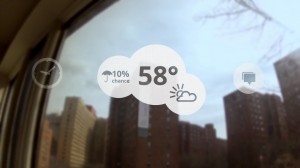Once again science fiction is turning into science fact. This time, it is Phillip K. Dick’s story, “Minority Report,” and the movie that followed. In this story as a person moves around the city, they receive instant advertising and information tailored directly to them.
 Google has now taken a step in this direction with the Google Glass Project. Using mobile broadband and miniaturized hardware, the Google glasses will allow a wearer to access any information on the fly and have it project in front of their eyes as they move.
Google has now taken a step in this direction with the Google Glass Project. Using mobile broadband and miniaturized hardware, the Google glasses will allow a wearer to access any information on the fly and have it project in front of their eyes as they move.
The glasses will tie into the GPS system and cell towers so the glasses will always be able to tell the wearer where they are and where they need to go. The glasses will also work as an MP3 player, cell phone, e-mail reader, and personal data assistant, and with no keypad, everything will be accessible by voice command.
Google has released a video demonstrating what their glasses will do and the video is very impressive. Of course the video is no different than the concept cars that every auto company releases in time for the annual shows, and whether or not the glasses actually make it to market is anybody’s guess.
Much of the technology is already available, especially the networking and computational tools. Already all smart phones will tell their users they are and where to needs to go, and the same smart phones have more computing power than a top of the line desktop computer had ten years ago.
As for the voice command technology, as any iPhone user will attest to, most of the capabilities of a smart phone can be accessed with the spoken word alone.
The camera on the Glasses is small, but no smaller than any other phone camera, and the capabilities of those are fully proven as well.
The most likely stumbling block for the glasses will be in the heads-up display technology. HUD, as it is commonly known, is not a new technology, the military has been using it decades now in both planes and tanks. What would be new would be the miniaturization of the equipment. The average HUD a pilot uses is incorporated into both the helmets and the plane itself, and the technology does not work outside of the plane. Google may have overcome these problems, but that will still be a very big hurdle.
Ask anyone who has attempted to use an LCD screen in the bright sun, and they will complain about the difficulty. There is no evidence that that problem has been overcome yet, but perhaps Google has solved that as well.
Finally there is the issue of distracted people. The dangers of texting or phoning and driving are evident, and a quick search on Google will show many videos of people who are unable to walk and text. The Google Glasses will take distraction to another level with people tripping everywhere.
There is no doubt that the Google Glasses or something like them is coming someday, but the question is when. Most technology experts are convinced that the video Google released is just hype and that the glasses are at best two years away and possibly even longer.
